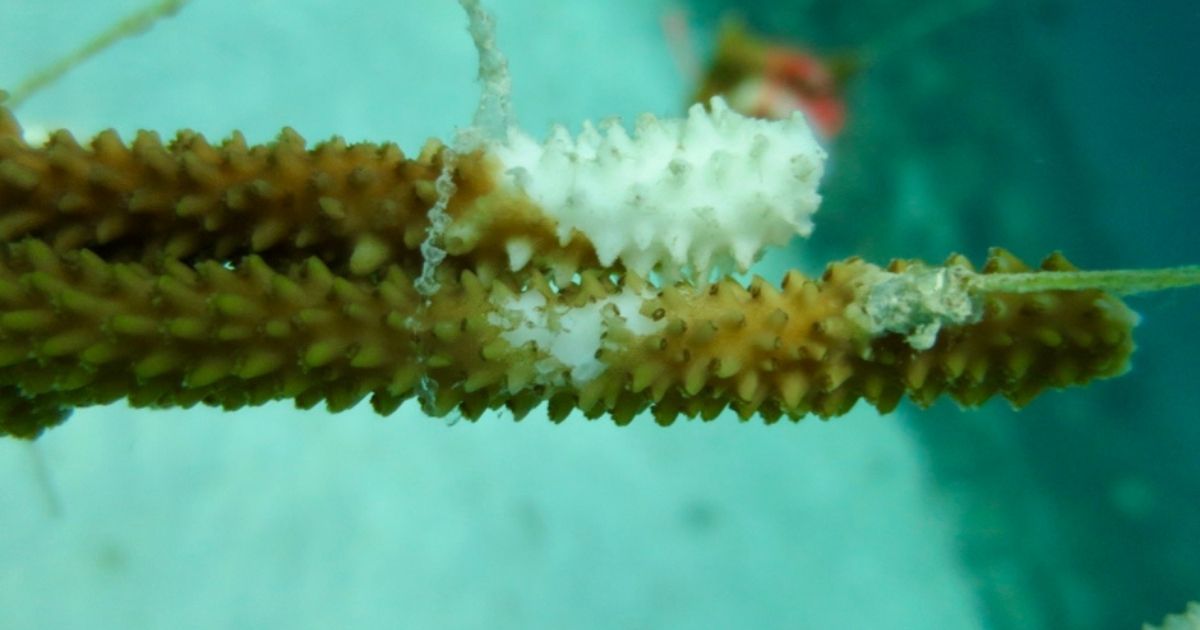Findings showed coral has core immune response regardless of disease type
As the world enters a next wave of the ongoing COVID-19 pandemic, we are aware now more than ever of the importance of a healthy immune system to protect ourselves from disease. This is not only true for humans but corals too, which are in an ongoing battle to ward off deadly diseases spreading on a reef.
A new study led by researchers at the University of Miami (UM) Rosenstiel School of Marine and Atmospheric Science looked at the immune system of elkhorn coral (Acropora palmata), an important reef-building coral in the Caribbean, to better understand its response to diseases such as white band disease and rapid tissue loss.
In the experiment, healthy corals were grafted to diseased ones. After one week, the corals were analyzed to study the coral's overall gene expression in response to disease, if they exhibited an immune response, and whether there were different signatures of gene expression for corals that didn't show signs of disease transmission. The researchers found that A. palmata has a core immune response to disease regardless of the type of disease, indicating that this particular coral species mounts an immune response to disease exposure despite differences in the disease type and virulence.
"Our results show that elkhorn coral is not immunocompromised but instead is actually actively trying to fight off disease," said Nikki Traylor-Knowles, an assistant professor of marine biology and ecology at the UM Rosenstiel School and senior author of the study. "This gives me hope that the corals are fighting back with their immune system."
Based upon these findings, the researchers suggest that corals that did not get disease may have tougher epithelia, a protective layer of cells covering external surfaces of their body. And, that the symbiotic dinoflagellate, Symbiodiniaceae, that live inside corals did not have differences in gene expression in response to disease, but over the course of the two-year study did develop differences.
Coral disease is considered one of the major causes of coral mortality and disease outbreaks are expected to increase in frequency and severity due to climate change and other human-made stressors. The Caribbean branching coral Acropora palmata which has already seen an 80 percent decrease on reefs primarily due to disease, which has resulted in them being classified as threatened under the US Endangered Species Act.
"These corals are keystone species for Florida reefs, so understanding that their immune systems are active is an important component that can be useful for protecting reefs," said Traylor-Knowles.
By Diana Udel, University of Miami Rosenstiel School of Marine & Atmospheric Science
Journal Reference:
Benjamin D. Young, Xaymara M. Serrano, Stephanie M. Rosales, Margaret W. Miller, Dana Williams, Nikki Traylor-Knowles. Innate immune gene expression in Acropora palmata is consistent despite variance in yearly disease events. PLOS ONE, 2020; 15 (10): e0228514 DOI: 10.1371/journal.pone.0228514
The study’s coauthors include: Ben Young and Nikki Traylor-Knowles of the UM Rosenstiel School; Former UM student Xaymara Serrano from NOAA’s Atlantic Oceanographic and Meteorological Laboratory; Stephanie Rosales from NOAA’s Cooperative Institute for Marine and Atmospheric Studies; Margaret Miller from SECORE International and Dana Williams from NOAA’s Southeast Fisheries Science Center.
Funding for the study was provided by NOAA’s Coral Reef Conservation Program (CRCP) Project/Task#S8KMCRPP00, ID31194, and the OAR NOAA omics initiative.



